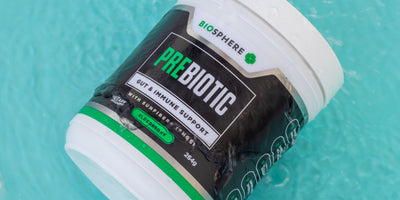
The Role of Prebiotics in Reducing Symptoms of Acid Reflux and GERD
Acid reflux and gastroesophageal reflux disease (GERD) are common digestive disorders affecting millions worldwide. These conditions can significantly impact quality of life, causing discomfort and potentially leading to more severe health issues. Recently, there has been growing interest in the role of prebiotics in managing these conditions. This article explores the potential benefits of prebiotics for those suffering from acid reflux and GERD.
Understanding Acid Reflux and GERD
Acid reflux, often experienced as heartburn, occurs when stomach acid flows back into the esophagus, causing irritation. This condition can be triggered by various factors including dietary choices, lifestyle habits, and underlying medical issues. Common symptoms of acid reflux include a burning sensation in the chest, regurgitation of food or sour liquid, and difficulty swallowing. These episodes can be occasional or frequent, leading to significant discomfort.
GERD is a more severe, chronic form of acid reflux. Characterised by frequent and persistent symptoms, GERD can lead to complications if left untreated. The lower esophageal sphincter (LES) is supposed to close after food passes into the stomach, but in GERD, it malfunctions, allowing acid to escape back into the esophagus. This not only causes pain and discomfort but can also lead to inflammation, esophagitis, and long-term complications like Barrett's esophagus, which increases the risk of esophageal cancer. Managing GERD often requires more intensive treatment compared to occasional acid reflux.
Standard treatments for acid reflux and GERD typically include lifestyle modifications such as avoiding trigger foods, eating smaller meals, and not lying down immediately after eating. Medications like proton pump inhibitors (PPIs), H2 blockers, and antacids are commonly prescribed to reduce stomach acid production and provide relief. In severe cases, surgical interventions like fundoplication may be considered. However, dietary interventions, particularly the use of prebiotics, are gaining attention as a complementary approach to traditional treatments, offering a natural way to improve gut health and reduce symptoms.
Introduction to Prebiotics
Prebiotics are a type of non-digestible fibre that serves as food for beneficial bacteria in the gut. Unlike probiotics, which are live bacteria that can be ingested through supplements or fermented foods, prebiotics support the growth and activity of these beneficial microorganisms already present in the digestive system. Prebiotics pass through the upper part of the gastrointestinal tract undigested and reach the colon, where they are fermented by the gut microbiota.
Prebiotics primarily come from carbohydrate fibres called oligosaccharides. Common dietary sources of prebiotics include chicory root, Jerusalem artichoke, garlic, onions, leeks, asparagus, bananas, and whole grains. These foods contain compounds such as inulin and fructooligosaccharides (FOS), which selectively stimulate the growth of beneficial bacteria like Bifidobacteria and Lactobacilli. Including a variety of prebiotic-rich foods in your diet can help maintain a balanced gut microbiome.
In addition to promoting gut health, prebiotics offer several other health benefits. They can enhance calcium absorption, improve bone health, and potentially support weight management by increasing feelings of fullness. By improving the composition of the gut microbiota, prebiotics can also strengthen the immune system and help protect against gastrointestinal infections. These benefits make prebiotics an important dietary component for overall health and well-being, especially for individuals dealing with digestive issues like acid reflux and GERD.
The Gut Microbiome and Digestive Health
The gut microbiome consists of trillions of microorganisms, including bacteria, viruses, fungi, and other microbes, that inhabit the digestive tract. This complex community of microorganisms plays a crucial role in various aspects of health, including digestion, immune function, and even mental health. The balance of these microorganisms is essential for maintaining gut health and preventing digestive disorders.
A healthy gut microbiome aids in the breakdown and absorption of nutrients from food. It also helps in the production of essential vitamins, such as vitamin K and certain B vitamins, which are crucial for various bodily functions. Moreover, the gut microbiota produces short-chain fatty acids (SCFAs) during the fermentation of dietary fibres, which provide energy to colon cells and have anti-inflammatory properties. These SCFAs help maintain the integrity of the gut lining and prevent the translocation of harmful pathogens into the bloodstream.
Imbalances in the gut microbiome, known as dysbiosis, can lead to various health issues, including digestive disorders like acid reflux and GERD. Dysbiosis can result from poor diet, stress, antibiotic use, and other factors. When harmful bacteria outnumber beneficial ones, it can lead to increased gut permeability, inflammation, and a weakened immune response. Restoring the balance of the gut microbiome through dietary changes and the inclusion of prebiotics can help alleviate symptoms of digestive disorders and promote overall health.
Prebiotics play a vital role in maintaining a healthy gut microbiome by selectively feeding beneficial bacteria. This helps in outcompeting harmful bacteria and promoting a balanced gut environment. By enhancing the growth and activity of beneficial bacteria, prebiotics can help reduce inflammation, improve digestion, and strengthen the gut barrier. These effects are particularly beneficial for individuals suffering from acid reflux and GERD, as they can help mitigate the underlying factors contributing to these conditions.
Mechanisms of Prebiotics in Reducing Acid Reflux
Prebiotics influence the composition and activity of gut bacteria, which can have significant effects on digestive health and the management of acid reflux. By promoting the growth of beneficial bacteria, prebiotics help create a healthier gut environment. Beneficial bacteria produce SCFAs during the fermentation of prebiotics, which help maintain an optimal pH in the gut. This can inhibit the growth of harmful bacteria and reduce the production of gas and bloating, common triggers for acid reflux.
One of the primary ways prebiotics can help reduce acid reflux is by reducing inflammation in the gut. Chronic inflammation is a significant contributing factor to many digestive disorders, including GERD. Prebiotics have anti-inflammatory properties that can help soothe the gut lining and reduce inflammation. This can prevent the exacerbation of acid reflux symptoms and promote healing of the esophagus.
The lower esophageal sphincter (LES) is a muscle that separates the stomach from the esophagus and prevents stomach acid from flowing back into the esophagus. The function of the LES is crucial in preventing acid reflux. Prebiotics may improve the tone and function of the LES by reducing inflammation and promoting a healthy gut microbiome. This can lead to fewer episodes of acid reflux and a reduction in the severity of symptoms.
Scientific Evidence Supporting Prebiotics for GERD
Several studies have investigated the potential benefits of prebiotics for managing GERD. Research has shown that prebiotics can positively affect gut microbiota composition, enhance gut barrier function, and reduce inflammation, all of which can help alleviate symptoms of GERD. For instance, a study published in the journal "Gut" found that prebiotic supplementation improved gut microbiota diversity and reduced markers of gut inflammation in individuals with GERD.
A review of studies on prebiotics and GERD suggests that prebiotics can help reduce the frequency and severity of acid reflux episodes by promoting a healthier gut environment. The findings indicate that prebiotics can enhance the growth of beneficial bacteria, reduce inflammation, and improve the function of the LES. These effects can contribute to better management of GERD symptoms and overall digestive health.
While the current research is promising, it is essential to acknowledge the limitations and need for further studies. Most studies have been conducted on small sample sizes and for short durations. Larger, long-term clinical trials are necessary to establish definitive recommendations and understand the full potential of prebiotics for managing GERD. Future research should also explore the specific mechanisms through which prebiotics affect GERD and identify optimal dosages and sources for maximum benefit.
Dietary Sources of Prebiotics for Acid Reflux Sufferers
Incorporating prebiotic-rich foods into a GERD-friendly diet can be beneficial for managing symptoms. Chicory root, for example, is an excellent source of inulin, a potent prebiotic fibre. It can be used as a coffee substitute or added to smoothies for a nutritional boost. Jerusalem artichokes are another rich source of inulin and can be roasted as a delicious side dish.
Garlic and onions are common prebiotic foods, but they can trigger acid reflux in some individuals. To reduce their potential to cause discomfort, they can be added to cooked dishes where their prebiotic benefits can still be obtained without causing reflux. Leeks and asparagus are milder options that can be included in soups, salads, and stir-fries.
Bananas are a gentle, prebiotic-rich fruit that can be easily incorporated into meals and snacks. They can be eaten on their own, added to smoothies, or used in baking. Whole grains, such as oats, barley, and whole wheat, are also excellent sources of prebiotics. Opting for whole grain versions of bread, pasta, and cereals can help increase prebiotic intake while maintaining a GERD-friendly diet.
Here is a sample meal plan incorporating prebiotic-rich foods:
- Breakfast: Oatmeal topped with sliced bananas and a drizzle of honey. This meal provides a good amount of prebiotic fibre from the oats and bananas.
- Lunch: Quinoa salad with roasted asparagus, leeks, and a light vinaigrette. The leeks and asparagus add prebiotic benefits while keeping the meal light and nutritious.
- Dinner: Grilled chicken served with a side of roasted Jerusalem artichokes and a garlic-infused vegetable stir-fry. This meal offers a variety of prebiotic sources, combined in a way that minimises the risk of triggering acid reflux.
- Snack: A banana smoothie with a touch of chicory root powder. This snack is both refreshing and beneficial for gut health.
Combining Prebiotics with Other Natural Remedies for GERD

Combining prebiotics with probiotics can enhance their benefits for managing GERD. Probiotics are live beneficial bacteria that can be consumed through supplements or fermented foods like yogurt, kefir, and sauerkraut. When taken together, prebiotics and probiotics can have a synergistic effect, improving gut health more effectively than either alone. Prebiotics provide the necessary food for probiotics to thrive, enhancing their ability to balance the gut microbiome.
Other natural remedies can complement the effects of prebiotics in managing GERD. Aloe vera juice, for example, is known for its soothing properties and can help reduce inflammation in the esophagus. Ginger is another natural remedy that can help reduce nausea and inflammation. It can be consumed as a tea, added to smoothies, or used in cooking.
Lifestyle changes are also crucial for managing GERD. Elevating the head of the bed can prevent acid from flowing back into the esophagus during sleep. Eating smaller meals more frequently throughout the day can reduce the pressure on the LES and minimise reflux episodes. Avoiding trigger foods such as spicy and fatty dishes, chocolate, caffeine, and alcohol can also help manage symptoms.
A holistic approach to managing GERD involves combining dietary changes with other lifestyle modifications and natural remedies. Stress management techniques, such as yoga and meditation, can help reduce the frequency and severity of reflux episodes. Staying hydrated is essential, but it is advisable to avoid drinking large amounts of water during meals, as this can increase stomach volume and pressure on the LES. Maintaining a healthy weight can also reduce pressure on the stomach and LES, further helping to prevent acid reflux.
Prebiotics vs. Probiotics: Which is Better for GERD?
Both prebiotics and probiotics offer unique benefits for managing GERD, and the best approach often involves a combination of both. Prebiotics primarily support the growth of beneficial bacteria and improve gut health indirectly. By feeding the good bacteria in the gut, prebiotics help create an environment that is less conducive to the growth of harmful bacteria, reducing inflammation and supporting digestive health.
Probiotics, on the other hand, directly add beneficial bacteria to the gut. This can offer more immediate relief for digestive issues, as probiotics can help restore balance to the gut microbiome quickly. Probiotics can be especially beneficial after a course of antibiotics, which can disrupt the balance of gut bacteria.
Case studies and patient experiences highlight the importance of a personalised approach. Some individuals report significant improvements in GERD symptoms when incorporating both prebiotics and probiotics into their diet. For example, a study published in the "Journal of Clinical Gastroenterology" found that a combination of prebiotics and probiotics significantly reduced symptoms of GERD in patients compared to a placebo group.
For optimal gut health and GERD management, it is recommended to start with small amounts of prebiotic and probiotic foods to monitor tolerance. Gradually increasing intake based on your body's response can help avoid potential side effects. Consulting a healthcare professional for personalised advice can ensure that you are taking the right approach for your specific needs.
Potential Side Effects and Considerations of Prebiotic Use
While prebiotics are generally safe and beneficial, some individuals may experience side effects, especially when first incorporating them into their diet. Common side effects include bloating, gas, and diarrhea. These symptoms occur because prebiotics increase the activity of gut bacteria, which produce gas as they ferment the fibres.
To minimise these side effects, it is advisable to start with a low dose of prebiotics and gradually increase the amount over time. This allows the gut microbiota to adjust and can reduce the risk of experiencing discomfort. Drinking plenty of water is also important, as it helps with the digestion of fibre and prevents constipation.
Certain individuals, such as those with irritable bowel syndrome (IBS) or small intestinal bacterial overgrowth (SIBO), may need to be cautious with prebiotics. These conditions involve an overgrowth of bacteria in the gut, and increasing prebiotic intake can exacerbate symptoms. It is essential for individuals with these conditions to consult with a healthcare professional before making significant dietary changes.
Overall, prebiotics can play a significant role in managing acid reflux and GERD when used correctly. Monitoring symptoms and adjusting intake based on your body's response can help ensure that you reap the benefits without experiencing adverse effects.
Practical Tips for Integrating Prebiotics into a GERD Management Plan
Integrating prebiotics into your diet can be a practical and effective way to manage GERD. Here are some step-by-step guidelines to help you get started:
- Begin with a low dose: Start by incorporating small amounts of prebiotic-rich foods into your diet. For example, you can begin with a tablespoon of chicory root in your morning smoothie or a small serving of roasted Jerusalem artichokes with dinner.
- Gradually increase: As your body adjusts to the increased fibre intake, gradually increase the amount of prebiotic foods in your diet. This slow introduction can help prevent side effects like bloating and gas.
- Monitor symptoms: Keep a food diary to track your intake of prebiotic foods and any changes in your symptoms. This can help you identify which foods work best for you and which may need to be limited.
Consult healthcare professionals: Before making significant dietary changes, it is always a good idea to consult with a healthcare professional, especially if you have underlying health conditions or are taking medications. They can provide personalised advice and help you create a balanced and effective GERD management plan.
Summary
Understanding Acid Reflux and GERD:
- Acid reflux involves stomach acid flowing back into the esophagus, causing heartburn.
- GERD is a chronic form of acid reflux with persistent symptoms and potential complications.
- Standard treatments include lifestyle changes, medications, and in severe cases, surgery.
- Prebiotics are non-digestible fibres that feed beneficial gut bacteria.
- Common sources include chicory root, Jerusalem artichoke, garlic, onions, leeks, asparagus, bananas, and whole grains.
- They differ from probiotics, which are live beneficial bacteria.
- The gut microbiome consists of trillions of microorganisms crucial for digestion and overall health.
- A balanced microbiome aids in nutrient absorption, vitamin production, and inflammation reduction.
- Prebiotics help maintain a healthy microbiome, promoting digestive health.
- Prebiotics promote the growth of beneficial bacteria, which produce short-chain fatty acids (SCFAs) that help regulate gut pH.
- They reduce inflammation in the gut, alleviating acid reflux symptoms.
- Prebiotics may improve the tone and function of the lower esophageal sphincter (LES), reducing reflux episodes.
- Studies indicate that prebiotics can improve gut microbiota diversity and reduce inflammation.
- Prebiotics show potential in reducing the frequency and severity of GERD symptoms.
- More extensive clinical trials are needed for definitive recommendations.
- Prebiotic-rich foods include chicory root, Jerusalem artichoke, garlic, onions, leeks, asparagus, bananas, and whole grains.
- Careful selection and preparation of these foods can minimise acid reflux triggers.
- Sample meal plans incorporate prebiotics into GERD-friendly diets.
- Prebiotics and probiotics can have synergistic effects on gut health.
- Natural remedies like aloe vera juice and ginger, along with lifestyle changes, can complement prebiotics.
- A holistic approach includes dietary changes, stress management, and maintaining a healthy weight.
- Prebiotics support the growth of beneficial bacteria, while probiotics directly add these bacteria to the gut.
- Both have unique benefits, and combining them can enhance gut health.
- Personalised approaches and consulting healthcare professionals are recommended.
- Common side effects include bloating, gas, and diarrhea.
- Starting with a low dose and gradually increasing intake can minimise side effects.
- Individuals with IBS or SIBO should consult healthcare professionals before using prebiotics.
- Begin with a low dose and gradually increase intake.
- Monitor symptoms and adjust intake based on your body's response.
- Consult healthcare professionals for personalised advice and to ensure a balanced approach.
Prebiotic Information
For everything you need to know about prebiotics and prebiotic supplements, check out our comprehensive information page here.
Prebiotic
Biosphere Nutrition’s Prebiotic Powder is a unique blend of Sunfiber® and Black Elderberry Extract, designed to nurture gut health and support the immune system. This easy-to-mix, great-tasting formula ensures optimal absorption and digestive comfort. To learn more about our Prebiotic, check out the product page here.








I am very interested in prebiotics and GERD. The author referred to a study published in Gut journal about prebiotic supplementation in individuals with GERD but I’m having a very hard time in finding this publication. Is it possible to send me a link to the publication or the abstract? Many thanks.